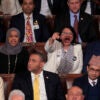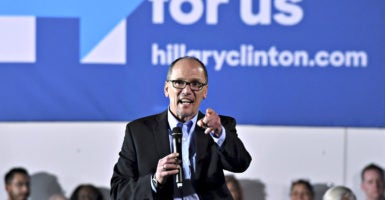Labor Secretary Tom Perez is campaigning actively to become the next chairman of the Democratic National Committee, prompting a watchdog group to investigate whether he has violated a law prohibiting federal government employees from engaging in partisan politics while on the job.
Two other Cabinet-level department heads in the Obama administration previously were found to have broken the law, called the Hatch Act.
The Hatch Act, passed in 1939, limits political activities by federal employees to ensure they do their taxpayer-funded work in a nonpartisan way and protects employees from partisan retaliation by a supervisor.
Breaking this law is an administrative violation, not a criminal act, with discipline ranging from a warning to removal.
Labor Department spokeswoman Mattie M. Zazueta said Perez was careful not to violate the law.
“Before deciding to run for DNC chair, Secretary Perez sought counsel from [the Labor Department’s] counsel for ethics, who informed him that it would be permissible for him to run while still serving as secretary,” Zazueta told The Daily Signal. Robert M. Sadler is the department’s counsel for ethics.
Zazueta added:
The Hatch Act allows federal employees to be a candidate for and serve as an officer in a political party. Secretary Perez is always extremely careful to follow the law and all rules associated with political activity, and takes the appropriate measures to keep any political activity separate from his official duties. He will continue to do so in this situation.
But Cause of Action Institute, a conservative government watchdog group, last week filed a Freedom of Information Act request asking for all communications by Perez with voting members of the the party organization, including emails, text messages, and voicemails.
“The law is clear: Public officials paid by taxpayers cannot use their position to engage in political activities,” Henry Kerner, assistant vice president of Cause of Action Institute, said in a public statement. “The Obama administration’s unprecedented history of Hatch Act violations threatens to undermine this important protection. Americans have a right to know if [Secretary] Perez used taxpayer-funded resources to further his own political campaign.”
“Public officials paid by taxpayers cannot use their position to engage in political activities,” @CauseofActionDC says.
Running for office within a party structure possibly wouldn’t be a violation of the Hatch Act, but soliciting support for a campaign could be, according to rules from the Office of Special Counsel, an independent government agency that investigates possible Hatch Act violations.
Cabinet secretaries officially are always on the clock. So, mixing politics with what is not supposed to be political would constitute a violation.
Politico reported that Perez “emailed all neutral and supportive party chairs, vice chairs, and executive directors” and asked the Democrat activists to join him on a conference call.
The portion of the Office of Special Counsel website devoted to “frequently asked questions” on the Hatch Act says: “A federal employee cannot send or forward a partisan political email from either his government email account or his personal email account (even using a personal device) while at work.”
The Democratic National Committee will select a leader in February. Perez is challenging Rep. Keith Ellison, D-Minn.
Perez is mounting something of a grassroots campaign, while Ellison has the backing of prominent Democrats such as the Senate’s new top Democrat, Charles Schumer of New York.
In July, the Office of Special Counsel found that Housing and Urban Development Secretary Julian Castro violated the Hatch Act by endorsing Hillary Clinton for president during an interview with Yahoo News in HUD’s TV studio about housing policy.
President Barack Obama opted not to take disciplinary action against Castro.
The Office of Special Counsel earlier determined that Health and Human Services Secretary Kathleen Sebelius violated the Hatch Act during the 2012 presidential race when she told a major LGBT advocacy group, the Human Rights Campaign, during a speech in North Carolina that it was “hugely important” to re-elect Obama.
Obama took no action against Sebelius, who resigned in April 2014.
While on the job, Labor Secretary Hilda Solis raised money for Obama’s re-election campaign. However, by the time audio recordings about her fundraising surfaced, Solis already had resigned from the Cabinet position.
The Hatch Act generally applies to merit-based civil service employees, who may be disciplined by their supervisor with a warning, a formal reprimand, administrative leave, and even termination, Office of Special Counsel spokesman Nick Schwellenbach told The Daily Signal.
If a question arises about a presidential appointee confirmed by the Senate, the Office of Special Counsel sends its finding to the president, who determines whether discipline is warranted.































